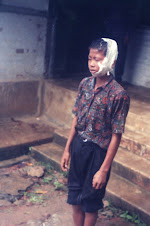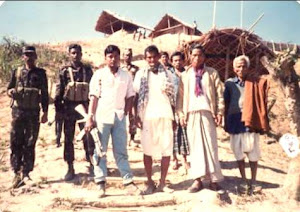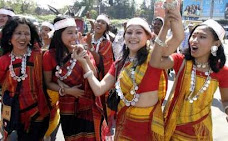Source from- http://www.state.gov/g/drl/rls/hrrpt/2007/100612.htm
Tribal people had a marginal ability to influence decisions concerning the use of their lands. There was little progress in the implementation of the 1997 Chittagong Hill Tracks Peace Accord. The government still refused to cede responsibility for key functions like land use and natural resources to local authorities, as called for in the Accord. Law-and-order problems and alleged human rights violations continued, as did dissatisfaction with the implementation of the Peace Accord.
The government continued to deny mobile phone and Internet coverage to the three districts comprising the Hill Tracts. While the government cited security concerns as its reason for curbing this coverage, human rights groups and local officials claimed that this was implemented in order to stunt development of the region. The Land Commission dealing with land disputes between tribal individuals and Bengali settlers did not function effectively in addressing critical land disputes. Tribal leaders remained disappointed with the lack of assistance provided to those who left the area during the insurgency. Local human rights organizations alleged that security forces took advantage of the state of emergency to increase human rights abuses, including arbitrary arrests, against indigenous people.
During the year according to a human rights organization, seven persons died and two were injured in violence in the Chittagong Hill Tracts. Moreover, seven persons were kidnapped and two persons were arrested.
In February the government withdrew 16 temporary camps of security forces in the Rangamati area of the Hill Tracts. Since the signing of the 1997 Peace Agreement, the government had withdrawn 196 camps, leaving approximately 280 camps.
The conflict between the Parbattya Chattagram Jono Sanghati Samity (PCJSS), which signed the 1997 Peace Agreement with the government and the United Peoples' Democratic Front (UPDF), which is opposed to the Peace Agreement, continued. On January 16, UPDF activists shot and killed Vinku Kumar Chakma, a youth front activist of PCJSS, at Chongrachhari in Khagrachhari district.
Tribal organizations continued to allege that security forces abused the indigenous population of the Hill Tracts. On December 9, the 10th anniversary of the signing of the Peace Treaty, leaders of the indigenous village of Mahalchari in Khagrachari district, held a press conference in Dhaka to allege ethnic Bengali settlers had encroached on their farmland. They claimed Bengali settlers, with assistance of local authorities, seized 366 acres of their farmland during the year. Late in the year, a UNDP-funded project to develop a nursery in the indigenous village of Maddya Lemuchari in Khagrachari fell through after Bengali settlers constructed homes on the location designated for the project. According to local villagers, despite the fact that they held title to the land, local authorities issued duplicate land titles to the settlers in violation of the law and the Peace Treaty.
On April 1, according to Hill Watch Human Rights Forum, army personnel raided the house of UPDF leader Sachib Chakma in the village Bogachhari in Rangamati district. As Sachib was not present, the soldiers allegedly took his father, wife, two minor children, and another person to the army camp in Naniarchar and abused the father before eventually releasing them.
The PCJSS and indigenous leaders alleged that Joint Forces personnel led by the army took advantage of the state of emergency to step up "suppressive actions" against indigenous people, including arrests and filing of false cases. According to their report, individuals could not protest due to the state of emergency.
On March 11, Joint Forces personnel arrested two UPDF members, Bimol Bikash Chakma and Milon Bihari Chakma, from Maischhari in Khagrachhari district, on suspicion of involvement in the killing of an army captain. When arrested, the two allegedly were found with illegal arms and ammunition.
Tribal people in other areas also reported loss of land to Bengali Muslims. The government continued work on national park projects on land traditionally owned by indigenous communities in the Moulvibazar and Modhupur forest areas. Despite the fact that the government filed corruption charges against several Forestry Department officials involved in these projects, development of these park projects continued. In addition, indigenous communities, local human rights organizations, and churches in the area claimed that the government had yet to withdraw thousands of false charges filed against indigenous residents by the Forestry Department.












